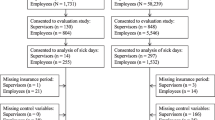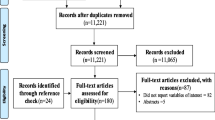Abstract
Objectives
To estimate the magnitude of the associations between different facets of supervisor behaviour and several health-related outcomes, and to assess whether these associations are mediated by known occupational health factors.
Methods
Cross-sectional data from the European Working Conditions Survey were analysed by generalised linear mixed models (n = 32,770). Six regression models were estimated. Dependent variables include musculoskeletal (upper body, lower limbs, backache) and psychosomatic symptoms (stress and self-assessed general health). Independent variables correspond to several facets of supervisor behaviours such as supervisor support, feedback on work, ability to solve conflicts, encouragement to participate in decisions, and known occupational risk and protective factors.
Results
Even though supervisor behaviour is mediated by several known occupational risk factors, it still accounts for a substantial proportion of explained variance. The order of magnitude of associations was comparable to the strength of associations of known occupational risk factors. Odds ratios vary from 0.79 95 % CI [0.73–0.86] to 1.12 95 % CI [0.97–1.29] for dichotomous dependent variables. Regression coefficients vary from –0.22 95 % CI [–0.28 to –0.17] to 0.07 95 % CI [0.04–0.10] for metric dependent variables. Results suggest that good conflict solving skills, supervisor’s work-planning ability, and a participative leadership style have the strongest predictive power regarding all health-related outcomes considered.
Conclusion
Supervisor behaviour seems to play a non-negligible role from an occupational health perspective concerning the prevalence of musculoskeletal and psychosomatic symptoms. Results suggest that supervisor behaviour should be routinely assessed and monitored, especially among occupational groups reporting a lower quality of supervisor behaviours.


Similar content being viewed by others
References
Arnold KA, Turner N, Barling J, Kelloway E, McKee M (2007) Transformational leadership and psychological well-being: the mediating role of meaningful work. J Occup Health Psychol 12(3):193–203
Bass BM, Bass R (2008) The Bass handbook of leadership, 4th edn. Free Press, New York
Beck AT (1963) Thinking and depression. I. Idiosyncratic content and cognitive distortions. Arch Gen Psychiatry 9:324–333
Diggle P, Heagerty P, Liang K, Zeger S (2002) Analysis of longitudinal data. Oxford University Press, Oxford
Eurofound (ed) (2012) Fifth European Working Conditions Survey. Publications Office of the European Union, Luxembourg
Eurostat (2006) NACE Rev. 2. Introductory Guidelines. Eurostat, Luxembourg
Fahrmeir L, Tutz G, Hennevogl W (2001) Multivariate statistical modelling based on generalized linear models. Springer, New York
Farioli A, Mattioli S, Quaglieri A, Curti S, Violante FS, Coggon D (2014) Musculoskeletal pain in Europe: the role of personal, occupational, and social risk factors. Scand J Work Environ Health 40:36–46. doi:10.5271/sjweh.3381
Fleishman EA, Mumford MD, Zaccaro SJ, Levin KY, Korotkin K, Hein MB (1991) Taxonomic efforts in the description of leader behaviour: a synthesis and functional interpretation. Leadership Quart 2(4):245–287
Franke F, Felfe J, Pundt A (2014) The impact of health-oriented leadership on follower health development and test of a new instrument measuring health-promoting leadership. Zeitschrift für Personalforschung 28:139–161
Gallup-Europe (2010) Fifth European Working Conditions Survey. Technical report
Gelman A, Carlin J, Stern H, Dunson D, Vehtari A, Rubin D (2013) Bayesian data analyses. Chapman & Hall, Boca Raton
Green AE, Albanese A, Shapiro N, Aarons G (2014) The roles of individual and organizational factors in burnout among community-based mental health service providers. Psychol Serv 11(1):41–49
Gregersen S, Kuhnert S, Zimber A, Nienhaus A (2011) Führungsverhalten und Gesundheit - Zum Stand der Forschung [Leadership behaviour and health—current research state] Gesundheitswesen (Bundesverband der Arzte des Offentlichen Gesundheitsdienstes (Germany)) 73:3–12 doi:10.1055/s-0029-1246180
Gurt J, Schwennen C, Elke G (2011) Health-specific leadership: Is there an association between leader consideration for the health of employees and their strain and well-being? Work Stress 25:108–127. doi:10.1080/02678373.2011.595947
Hadfield J (2010) MCMC methods for multi-response generalized linear mixed models: The MCMCglmm R Package. J Stat Softw 33:1–22
ILO (2008) International standard classification of occupations. International Labour Organisation, Geneva
Joormann J, Quinn ME (2014) Cognitive processes and emotion regulation in depression. Depress Anxiety 31(4):308–315
Judge TA, Piccolo RF (2004) Transformational and transactional leadership: a meta-analytic test of their relative validity. J Appl Psychol 89:755–768. doi:10.1037/0021-9010.89.5.755
Judge TA, Piccolo RF, Ilies R (2004) The forgotten ones? The validity of consideration and initiating structure in leadership research. J Appl Psychol 89:36–51. doi:10.1037/0021-9010.89.1.36
Junker NM, van Dick R (2014) Implicit theories in organizational settings: a systematic review and research agenda of implicit leadership and followership theories. Leadership Quart 25:1154–1173. doi:10.1016/j.leaqua.2014.09.002
Kuoppala J, Lamminpaa A, Liira J, Vainio H (2008) Leadership, job well-being, and health effects–a systematic review and a meta-analysis. J Occup Environ Med 50:904–915. doi:10.1097/JOM.0b013e31817e918d
Mintzberg H (1973) The nature of managerial work. Harper & Row, New York
Nyberg A, Bernin P, Theorell T (2005) The impact of leadership on the health of subordinates, vol 1. National Institute for Working Life, Stockholm
Nyberg A, Alfredsson L, Theorell T, Westerlund H, Vahtera J, Kivimaki M (2009) Managerial leadership and ischaemic heart disease among employees: the Swedish WOLF study. Occup Environ Med 66:51–55. doi:10.1136/oem.2008.039362
Revelle W, Zinbarg R (2009) Coefficients Alpha, Beta, Omega, and the glb: Comments on Sijtsma. Psychometrika 74:145–154. doi:10.1007/s11336-008-9102-z
Schyns B, Schilling J (2013) How bad are the effects of bad leaders? A meta-analysis of destructive leadership and its outcomes. Leadership Quart 24:138–158. doi:10.1016/j.leaqua.2012.09.001
Skakon J, Nielsen K, Borg V, Guzman J (2010) Are leaders’ well-being, behaviours and style associated with the affective well-being of their employees? A systematic review of three decades of research. Work Stress 24:107–139. doi:10.1080/02678373.2010.495262
Tepper B (2000) Consequences of abusive supervision. Acad Manag J 43:178
Theorell T, Nyberg A, Leineweber C, Hanson LLM, Oxenstierna G, Westerlund H (2012) Non-listening and self centered leadership—relationships to socioeconomic conditions and employee mental health. PLoS ONE 7(9):e44119
UNESCO (2012) International standard classification of education ISCED 2011. UNESCO Institute for Statistics, Montreal
Van Buuren S (2012) Flexible imputation of missing data. Chapman & Hall, Boca Raton
Wu T, Hu C (2009) Abusive supervision and employee emotional exhaustion: dispositional antecedents and boundaries. Group Org Manage 34(2):143–169
Yukl G (2013) Leadership in organizations. Pearson, Essex
Acknowledgments
For the purposes of this paper, data access was granted by the UK Data Service established by the Economic and Social Research Council in the UK (http://ukdataservice.ac.uk).
Author information
Authors and Affiliations
Corresponding author
Ethics declarations
Conflict of interest
The author declares that he has no conflict of interest.
Electronic supplementary material
Below is the link to the electronic supplementary material.
Rights and permissions
About this article
Cite this article
Montano, D. Supervisor behaviour and its associations with employees’ health in Europe. Int Arch Occup Environ Health 89, 289–298 (2016). https://doi.org/10.1007/s00420-015-1072-8
Received:
Accepted:
Published:
Issue Date:
DOI: https://doi.org/10.1007/s00420-015-1072-8




